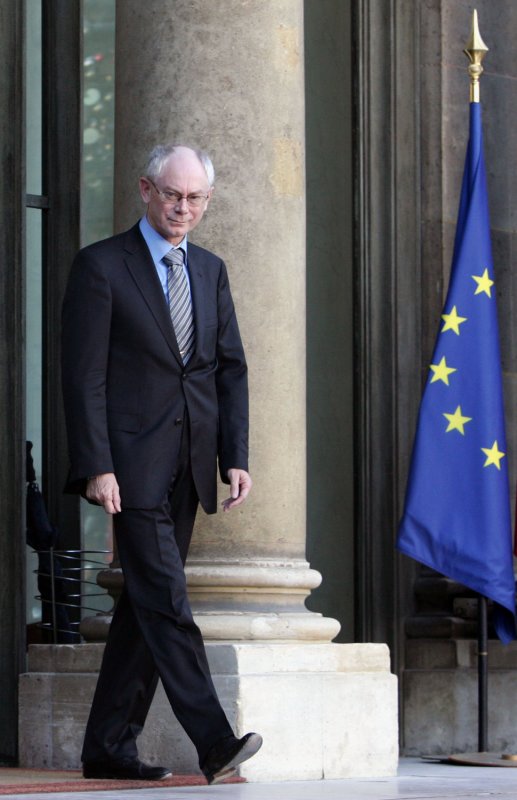EU's first president Herman Van Rompuy walks past a EU flag as he leaves the Elysee Palace, in Paris, December 04, 2008, after meeting with French President Nicolas Sarkozy. Van Rompuy embarked on a tour of European capitals after he was chosen for the newly-created post at an EU summit last month. UPI/Eco Clement |
License Photo
BRUSSELS, Jan. 7 (UPI) -- EU countries aren't doing enough to meet the body's energy efficiency targets, European Commission President Jose Manuel Barroso has warned.
Member states four years ago agreed to boost energy efficiency by 20 percent until 2020 but current commitments would only reach around half the target.
So far, member states are "not delivering and the way that the process is being pursued is far from perfect," Barroso was quoted as saying by news Web site Euractiv.com this week in Brussels.
The European Union has also agreed to reduce greenhouse gas emissions by 20 percent, and to boost the level of renewables in the energy mix to 20 percent, all by 2020 compared with 1990 levels.
While the other targets are binding, the energy efficiency one isn't yet, "so probably this is one of the reasons why we are not going so fast in energy efficiency," Barroso said. The EU is well on track, for example, to meet its renewable energy targets.
The European Parliament last month passed a motion to make the efficiency target binding but observers expect a Feb. 4 meeting to make little progress on the issue.
Large member states, including Germany, are against making the target binding, fearing it could hamper growth in their economies.
More than $10 billion in EU energy efficiency grants, for example, are unclaimed, Marie Donnelly, a senior official at the commission's energy directorate, told EurActiv in December.
Barroso said he was nevertheless optimistic that the 20 percent efficiency target can still be met.
"That's why I'm going to discuss with member states how we can now do things that reach the 20 percent target by 2020 on energy efficiency, because the potential for savings in energy in transport and households, buildings and industry are really there," he said.
Reducing energy consumption is a key EU strategy to reduce the continent's carbon dioxide footprint and become less dependent on foreign oil and gas. Proposed measures have included body-wide efficiency standards for household appliances, buildings and car engines.
Meanwhile, the EU is pushing for a diversification of its energy mix.
Together with Energy Commissioner Guenther Oettinger, Barroso will travel to Azerbaijan and Turkmenistan next week to support the delivery of Central Asian gas to the EU.
The Nabucco pipeline, listed by the EU as a priority energy project, is expected to feature prominently in the talks. It faces competition from the large Russian South Stream project and several smaller pan-European pipelines.















